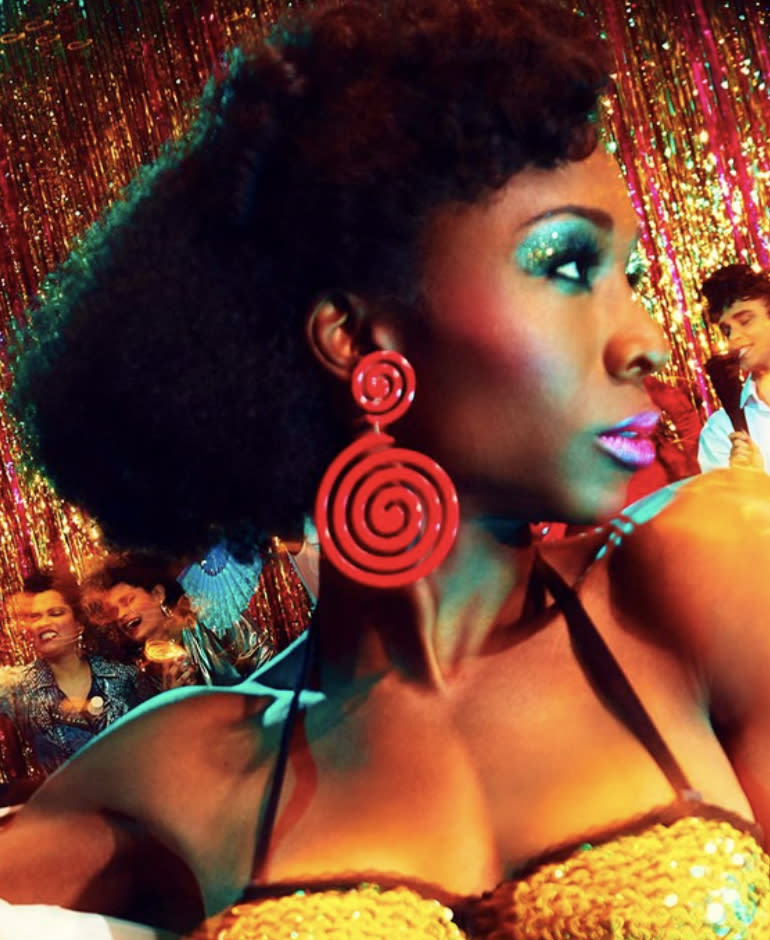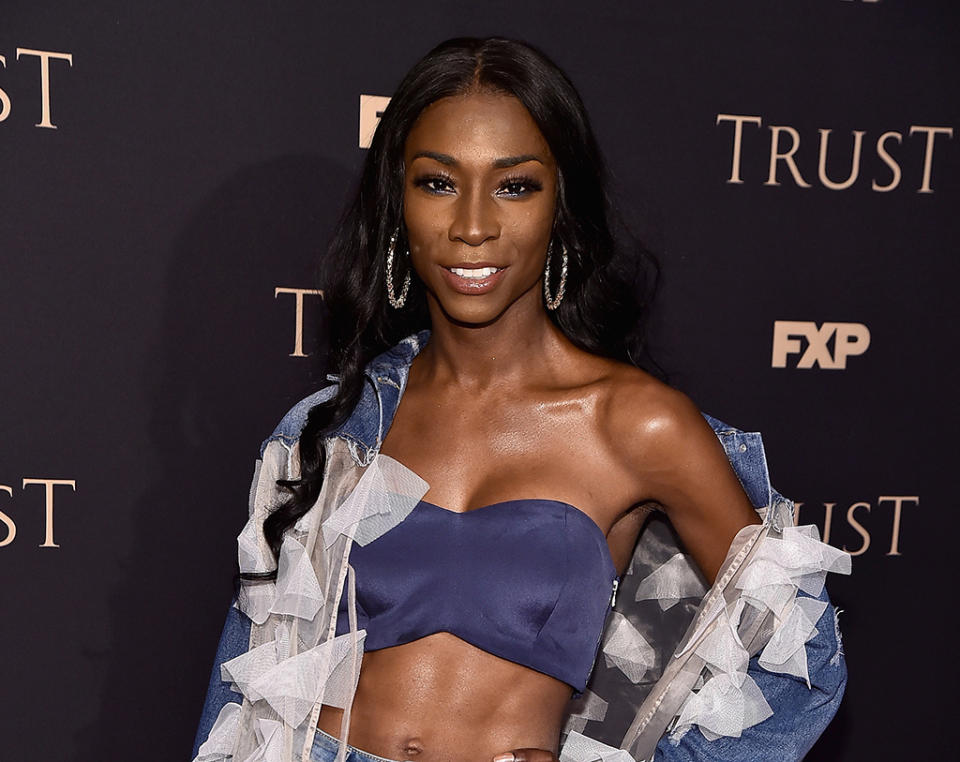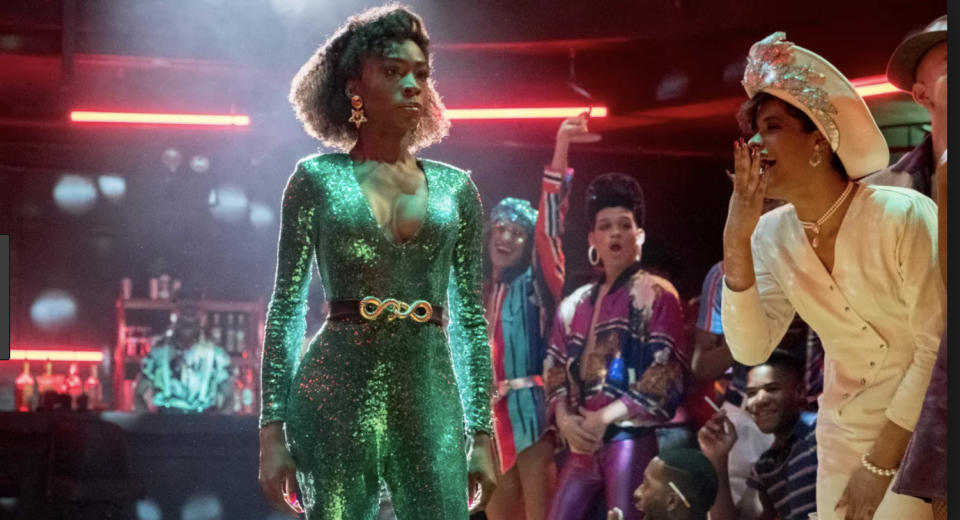Trans advocate Angelica Ross on her ‘Pose’ character and how she’s giving back

On FX’s hit series Pose, Angelica Ross plays Candy Abundance, a trans woman of color active in New York City’s ball culture scene of the 1980s. The series, which is co-produced and sometimes directed by Ryan Murphy, is making history, since it features the largest ever number of trans and LGBTQ actors in regular roles in a series.
The 1990 documentary Paris Is Burning first brought mainstream attention to the ball scene depicted on Pose. In the ball scene of the era, groups who call themselves “houses” compete with each other in highly elaborate categories and are judged on their outfits, voguing, and attitude. The balls served as a largely welcoming home for the trans community. Often this was the only safe place where these people could find shelter, particularly if their families disowned them or if they were running away from abuse. Ross has often spoken about how the ballroom scene sought to carve out a space for the trans community and in her real-life roles of artist, activist, and CEO, she aims to do the same.
Growing up, Ross struggled for acceptance from friends and family. After dropping out of college, she decided to join the U.S. Navy, where after only six months of service, she received an “uncharacterized” discharge because she was being harassed. The only job opportunity she could find was as a model on an adult website, where her tech expertise quickly took her from in front of to behind the camera, cropping and adjusting photos. She was ultimately inspired to create TransTech in 2014, which seeks to help fellow members of the LGBTQ community hone technical skills that can increase their employment opportunities.
In a wide-ranging conversation with Yahoo Lifestyle, Ross addresses her journey, her consistent philosophy of giving back, her company, and her character on Pose.

You originally resisted auditioning for a part on Pose, before Ryan Murphy created the role of Candy Abundance for you. Can you share that story?
I didn’t know too much about the show initially. I just knew it was going to focus on the ballroom scene and that they had these two characters, Electra and Blanca, that they were casting. I had a little bit of information from my agents that Electra was the mother of the house, a seasoned older character, and Blanca was this young trans woman breaking out and wanting to start her own house. When I heard the name Blanca, I had reservations, because I knew that role was intended for a Latina trans woman. It didn’t feel like it fit, so I passed it to other girls and encouraged them to audition for the role. My agents had already been working at setting up an audition for me, and I didn’t know that. They pushed me to do it, I did a self-tape, and I ended up getting a callback off of that tape and being flown to New York and having to negotiate my deal as though I’d already booked the part of Blanca.
After the audition, I felt like I’d screwed it up. I got a charley horse in the middle of it, because I thought I was Carrie Bradshaw and walked there in stilettos. So during the audition, I started doing lunges and used it to show my personality, and they were enjoying it in the room. After the audition, Ryan Murphy told me I was a talented actress, and he looked forward to working with me. The way it went down, I thought he was pushing me out the door with a friendly goodbye. I went back to my hotel that night and cried my eyes out. I remember getting on Instagram in a moment of vulnerability and talking to my followers, saying, “I did the best I could but that might not have been good enough, and I’m just going to keep my head up and know that what is for me won’t pass me by.” Months later, I got a call from production saying that not only was I going to be a part of the show but that Ryan Murphy had created a role specifically for me. It was an example of what is for you will not pass you. It helped me into a space of not having anxiety around opportunity. Nowadays, I’m turning down auditions and roles, and that’s a nice place to be. If I hear a part is for a trans woman and it’s not the archetype or character that I want to do in this day and age, I can say no.
What can fans of the show look forward to for Candy in Season 2 of Pose?
I think they can look forward to Candy’s look being more pulled together. She’s coming into her own as a housemother. Candy has always been one to struggle with her look and with her body, and I think in Season 2, you’re going to see her be more confident in her body (maybe a little too confident, who knows). She still needs to learn a few lessons that Electra has been learning, as she’s starting to get sweeter. Hopefully, she gets therapy next season! That would be great, but I don’t know that for sure!
What do you hope Pose can accomplish as a show?
The show has hit such a mainstream audience that its representation of trans-ness is helping to illustrate for other productions how foolish it would be to hire someone not trans for a trans role. There is all this authenticity available in a spectrum of different colors, shapes, sizes, and orientations. The show continues to deepen the bench. We are bringing interns to learn behind the scenes and getting trans people to be able to shadow producers and directors. Many people in my community want to act. Just like with any discipline, you start at the bottom. There are only so many Screen Actors Guild credits you can rack up as a dead trans prostitute on SVU. But we have Pose Balls happening with 300 attendees every episode. That means a lot of people in my community now have an opportunity to add up those credits to get into the game and to get the experience.
Pose has done more than its share of shifting power to our community. It’s shifted power to Janet Mock as a director and a producer and shifted power to Our Lady J as a producer and as a writer. Now it’s shifting power to me as a trans person to use my power to say, “Hey, I need my makeup artist to be a black trans woman.” The show has also strengthened my ability to create content, and then I get to deepen the bench, and it happens all over again. I’ve always been a content creator. Miss Ross Inc. is my company, and I’m executive producing and writing. What I love about the show is that it is a real symbol of trans life as a whole. It is not for the faint of heart. It is hard but also beautiful and fun. We make our own family. Showing both sides of that is something that the show does so well.

How has portraying Candy informed your life and your work as an activist? What has she taught you?
Candy has taught me a lot. There were moments when I started playing Candy where I thought, “This girl is a bit much.” I’ve cried so many times watching Pose, just as a fan of the show. There’s one moment in particular that always gives me goosebumps. It’s Episode 4, when Candy tells Electra that she doesn’t get to dictate her reality. She walks into the ballroom and Teena Marie’s song, “Lovergirl” is playing, and the force at which she lifts her head up gets me very emotional every time, because within that small gesture I feel like I illustrated the “Pay it” spirit that a lot of trans women have. “Pay it” means when it comes to being trans or anything where there is a cost to it, we are saying that we will pay that cost any day. It’s just the look in Candy’s eyes that’s inspired me to be persistent, to not take no for an answer, to be the one who decides I get to dictate my reality. Also, Candy is a fun girl. She has a chip on her shoulder, but that’s because she feels she’s the only one who is being humiliated in this competitive and brutal environment. She has to figure out how to win in her body, how to succeed in her lane. I think that’s the journey that makes me emotional. I want to see her figure it out and finally start winning.
In Pose, some of the characters who are disowned by their families and find acceptance in the ball community are very young. What is some advice you’d give to young people in the LGBTQ community?
There are two main areas I would place focus. One is for people to realize that it can be easy to get caught up in the physical aspects of transitioning, but there’s a whole other side to this that needs to be addressed, which is the spiritual side. I encourage people to root their transition in spirituality. If they don’t do that, it can set them up to experience a lot more suffering attached to the up and downs of a physical transition. Secondly, I would say find a skill and become excellent at it. You do not have to be better than anyone else at any given thing; you have to be great at something. So many folks are getting tricked into this idea that advocacy is celebrity, and not seeing the strings behind it all. Laverne Cox is a great advocate, and to have the space that she has, for years she went to drama school. Janet Mock has the space that she has, but she also has a master’s degree in journalism. The reason they make great advocates is that they come from a place of authority. You need to become an authority on something. If you’re the best at that, from that space is where you can advocate. Being trans is just the first step, because after you transition, the real work starts.
What was the impetus for TransTech, and how did you go about creating it?
I started off as a sex worker, and after being fired from four jobs, I was forced to consider the adult industry. The message we got as trans women was, “What else are you going to do, short of going into the adult entertainment industry?” What was so profound about my experience there was that I had the sense that, “This is not right for me, I’m worth more than this, but no one else is paying my bills or taking care of me right now. I need to do this, and I will not judge myself for that.” As I did that, my transition was being marginalized and exploited by the sex industry to do escorting and modeling on an adult website.
At one point, the woman who owned the site was trying to save money and made me her webmaster. I uploaded all the photos of the models each month and freshened up the design of the webpage. I eventually taught myself CSS and HGML; I would go to Lynda.com and watch video tutorials to show myself how to do these things.
I ended up saying, “I don’t want to let you exploit me on your website, I’ll exploit myself.” So I created my own adult site for a little bit. Then, without judgment and with grace, I realized I wanted to do more than that. That’s the blueprint I tried to offer to my community at TransTech. To say if you are doing sex work: “Here is a way out if you want one. If you don’t want a way out, you can also empower yourself by becoming your own boss.” That’s why it’s been essential but tough for me to share my story. I had to figure it out. I will say that it’s unfortunate that we have a lot of unchecked anti-blackness within the LBGTQ organization. If you’re someone like me, a black trans woman who has carved out a space to address these issues and is having any traction whatsoever, why wouldn’t you support another black trans woman to do the work?
What do you wish people understood about the LGBTQ community?
One of my favorite lines from Pose is when the doctor says to Electra, “It’s never a bad idea to choose yourself.” What I want society to know is the LGBTQ community is making courageous steps to choose themselves in a world that says they’re not the ideal choice. Do the work to be more authentic and to choose yourself. That is the journey of our community, and we want everyone to join the party with us. We have no problem baking cakes for their weddings; we have no problem doing makeup for the bride. We’ve always been ready to celebrate others life choices and moments, and we as a community are just asking that others do the same for us.
Read more from Yahoo Lifestyle:
Follow us on Instagram, Facebook, and Twitter for nonstop inspiration delivered fresh to your feed, every day.

